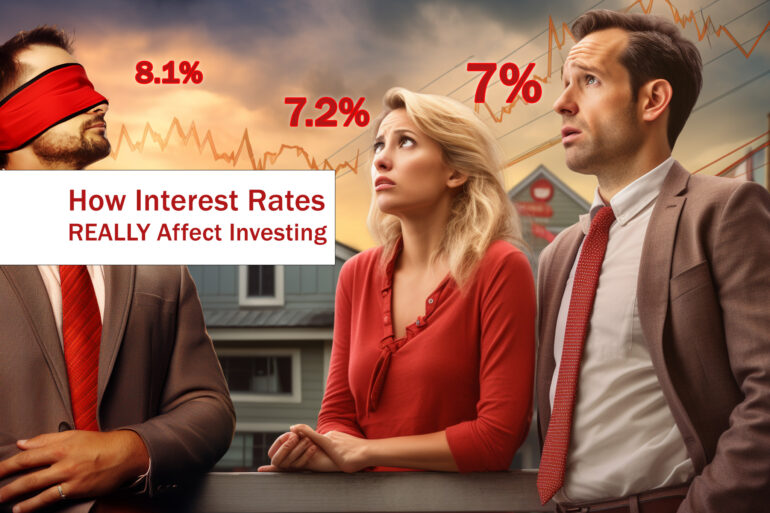How Interest Rates REALLY Affect Investing
The current economic climate seriously affects real estate investment opportunities, and one of the greatest factors is high interest rates. What specific impacts do high interest rates have on real estate investing? Should agents, investors, or aspiring homeowners be worried as the Federal Reserve prepares to raise interest rates once again? Let’s take a look.
The number of people who want to borrow and lend money must remain balanced or else interest rates would fluctuate and cause economic turmoil. The Fed’s job is to keep those price fluctuations in check.
How Are Interest Rates Determined?
In layman’s terms, interest rates are the price people must pay to borrow money for property loans. As more people request loans for residential and commercial properties, the Federal Reserve finally approved an interest rate hike in March 2022, which was the first increase since December 2018.
Since then, the Fed has increased interest rates several more times and plans on two more spikes in 2023. It’s all about the law of supply and demand. If there is a greater demand for real estate investments, the Fed might have to increase interest rates to keep prices stable and prevent the market from collapsing.
Here are the average national interest rates as of July 2023 — keep in mind that these percentages might not apply to your local housing market:
- 30-year fixed rate: 7.25%
- 30-year fixed jumbo rate: 7.24%
- 15-year fixed rate: 6.54%
- 5/1 ARM rate: 6.22%
The number of people who want to borrow and lend money must remain balanced or else interest rates would fluctuate and cause economic turmoil. The Fed’s job is to keep those price fluctuations in check. By raising interest rates, it simultaneously improves prices and forces buyers to consider their investments more carefully.
Although buying single-family houses wholesale or flipping them for profit are viable real estate investment options, they might not be the best choice at this time.
Residential Price Stabilization
The main impact of high interest rates is the stabilization of housing prices. From 2020 through mid-2022, during the height of the COVID-19 pandemic, interest rates were low and median home prices reached all-time highs due to low demand. This dynamic has begun to flip, with the Fed periodically raising interest rates to help housing prices return to affordable levels.
Realtor.com’s June Housing Report showed a 0.9% decrease in median home prices. Although the drop is small, it’s the first reported downward movement since 2017. The report also showed a 7% increase in active listings from the previous year. This news is promising because home prices and market activity tend to peak during the summer. If the 0.9% decrease is any indication, investors can expect to see even lower prices later in 2023.
It’s also worth noting that housing developers are seeking more housing projects and thus bringing more investment opportunities to the table. These projects are primarily apartments and multi-family properties. Renting became more common than homebuying across the U.S. in recent years, and that trend will continue as these projects reach completion.
Although buying single-family houses wholesale or flipping them for profit are viable real estate investment options, they might not be the best choice at this time. Investors who are interested in multi-family properties or apartment buildings can expect to see more activity in the near future as nationwide efforts to address the affordable housing crisis gain momentum.
In other words, it will become more difficult to estimate the long-term profitability of a property in the coming months.
Higher Capitalization Rates
Rising interest rates also lead to higher capitalization rates — better known as “cap rates” — which is a huge game changer for real estate investors. The cap rate is essentially the difference between a property’s required rate of return and its expected growth rate. It’s a helpful metric for assessing property values and evaluating risk.
High cap rates generally indicate a higher level of risk if you’re attempting to get stable income from your real estate investments. So, although the down payment might be affordable, the property’s cap rate might indicate that the investment is unprofitable in the long run. You also need to account for depreciation or changes in your local market that impact the property value.
In other words, it will become more difficult to estimate the long-term profitability of a property in the coming months. We have already seen an increase of real estate investors using online valuation tools like Zillow and Realtor.com to simplify their calculations. In fact, 22% of homeowners use online valuation tools to get an accurate estimate of their property values.
The chances of a crash are lower than they were in 2021 and 2022, but this current situation is still unstable and unprecedented in the U.S.
Buy or Sell?
The real estate industry has been much kinder to sellers than buyers in the last few years. The market is finally starting to shift back toward the buyer’s favor as prices stabilize. However, investors should hang tight and focus on opportunities for short-term income properties. New apartments and multi-family homes should be your main targets.
Real estate investment trusts (REITs) should also be on your radar. Unlike physical property investments, REITs allow you to hedge against inflation and generate consistent income despite the economy’s fragile state. They can give you a stake in a variety of residential, commercial, and specialty properties.
As a general rule, properties with shorter lease terms are the safest investments when interest rates are high. You don’t want to get caught in a long-term commitment that’s losing money while the economy is still fragile. Focus on investments that will get you strong short-term results and stay patient with the economy’s recovery.
Although property prices are beginning to stabilize, there is still the possibility of a market crash for investors to consider. If a crash occurred, prices would plummet, and the market would flood with buyers looking to make a good deal or a quick buck. The Fed would have no choice but to raise interest rates even further to keep supply and demand balanced.
On the other hand, a market crash could also cause investors to lose interest in the market. A decline in demand would lead to the opposite effect — higher property prices and lower interest rates. The chances of a crash are lower than they were in 2021 and 2022, but this current situation is still unstable and unprecedented in the U.S.
Market Improvement Will Be Slow
Nobody likes high interest rates, but they are a necessary measure to restore balance and affordability to the world of real estate. Improvements will be slow as prices level out and low to middle-income buyers return to the fold. There should be an increase in investment opportunities in the future, but investors must be patient with the market’s recovery.








